NIL
The University of Wisconsin sues Miami for allegedly tampering with former Badger Xavier Lucas
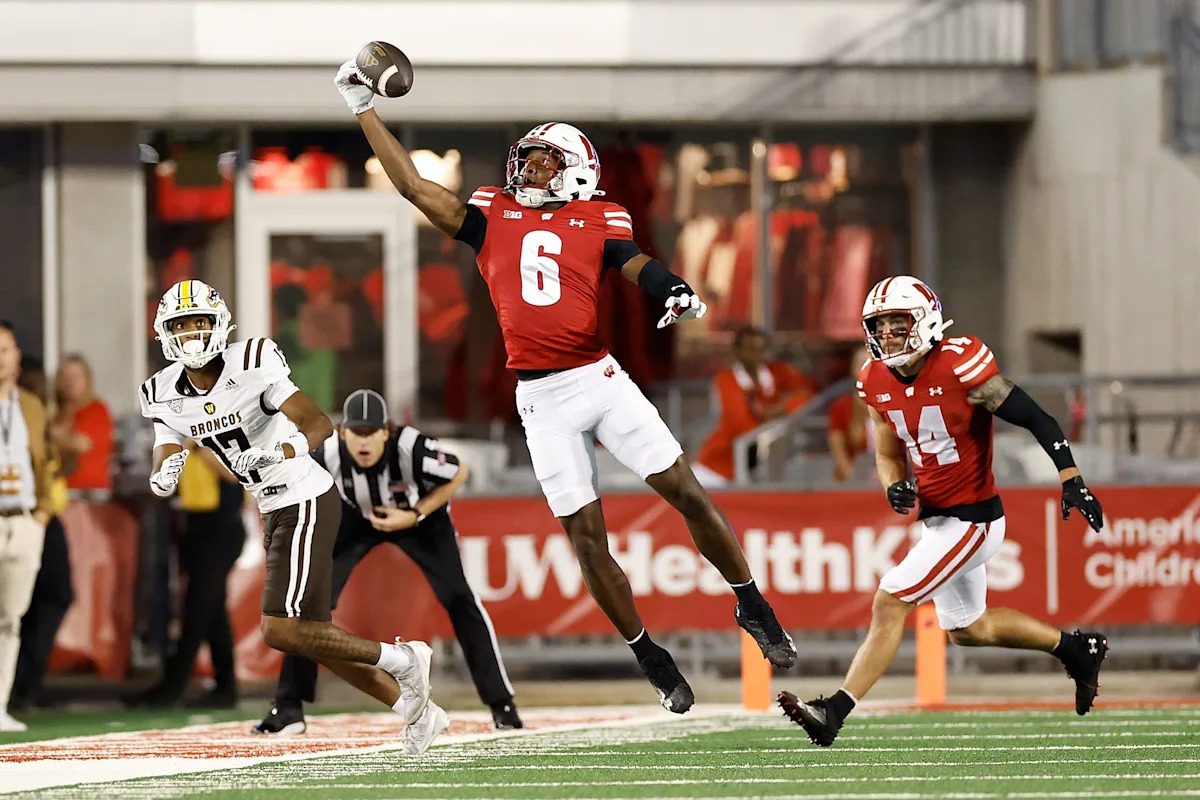
MADISON – The Xavier Lucas saga is far from over.
Yahoo Sports reported June 20 that the University of Wisconsin and its NIL collective, the Varsity Collective, are suing the University of Miami for what is termed tortious interference with the former Badgers cornerback who is now a part of the Miami Hurricanes football team.
Advertisement
The Journal Sentinel obtained a copy of the 23-page complaint filed in Dane County Circuit Court on June 20. In the document Wisconsin provides a timeline for the NIL agreements it and the Varsity Collective reached with Lucas, offers details of how it alleges the Miami football program tampered with Lucas and allege a broader pattern of tampering in the Miami program with other student-athletes.
Wisconsin seeks damages for the financial and reputational harm it says it experienced, a declaration that Miami’s conduct with Lucas constituted tampering plus any other penalty the court deems proper.
“Now more than ever, it is imperative to protect the integrity and fundamental fairness of the game, including in connection with NIL contracts,” the complaint read. “Indeed, student-athletes’ newfound NIL rights will be rendered meaningless if third parties are allowed to induce student-athletes to abandon their contractual commitments.”
Xavier Lucas had a promising freshman season at Wisconsin
The case stems from Lucas’ controversial departure from the Badgers football program in December. The native of Pompano Beach, Florida, announced his intention to transfer Dec. 19.
Advertisement
Losing Lucas was a blow to UW, which already had lost a handful of players from the secondary to the transfer portal. According to Pro Football Focus, Lucas played more snaps (203) than any freshman on the team last season. He played in all 12 games with one start and registered 18 tackles, one interception and one sack.
With the transfer portal scheduled to close Dec. 28, Lucas posted on X that the Wisconsin football program wrongfully declined to enter his name into the portal, a move that prevented other teams from contacting him without breaking NCAA rules.
In January, Lucas circumvented the transfer portal by withdrawing from Wisconsin and enrolling at Miami. He eventually joined Miami’s football team and participated in spring practice with the Hurricanes.
A few days after Lucas left UW, Wisconsin offered its side of the story. In a statement issued on Jan. 18, the university said it didn’t put Lucas’ name into the transfer portal because he signed a two-year NIL agreement Dec. 2 that it believed was still in effect and enforceable. The university also said Lucas entered into a separate agreement with Varsity Collective, which connects Badger athletes with NIL opportunities.
Advertisement
Wisconsin also said in its January statement that it had credible information that indicated impermissible contact between Lucas and University of Miami personnel.
That information was detailed further in Wisconsin’s legal complaint.

MADISON, WISCONSIN – AUGUST 30: Xavier Lucas #6 of the Wisconsin Badgers intercepts a pass in the fourth quarter against the Western Michigan Broncos at Camp Randall Stadium on August 30, 2024 in Madison, Wisconsin. (Photo by John Fisher/Getty Images)
Wisconsin outlines its allegations against Miami
The complaint provides more specific details of the allegations UW made against Miami in December, which include impermissible contact on multiple occasions with Lucas or his representatives. The complaint refers to Lucas as “Student-Athlete A” rather than using his name.
Among the allegations:
* A Miami coach and prominent alumnus visited Lucas at the Florida home of one of his relatives in December. UW says it received information about the in-home visit from a relative of Lucas on Dec. 18.
Advertisement
* UW accused Miami of a broader culture of tampering, alleging that Miami went after a second player even though that player made a written commitment to another school, a commitment that was reflected in the transfer portal. The player wasn’t identified by name.
The University of Wisconsin, Big Ten issue statements
UW issued a statement. Here it is in its entirety.
“The University of Wisconsin-Madison remains committed to ensuring integrity and fundamental fairness in the evolving landscape of college athletics. After reviewing all facts and evaluating options, the university today filed a complaint in Wisconsin state court outlining our allegations against the University of Miami.
Advertisement
“While we reluctantly bring this case, we stand by our position that respecting and enforcing contractual obligations is essential to maintaining a level playing field. In addition to our legal action, we will continue to be proactive to protect the interests of our student-athletes, our program and the broader collegiate athletics community. We appreciate the support of our university leadership and the Big Ten Conference. As we move forward, we will respect the court process and provide further updates only as appropriate.”
The Big Ten Conference, which publically supported UW in January, continued to voice its support.
Here is the statement the league issued to Yahoo on June 20.
“We stand by our position that respecting and enforcing contractual obligations is essential to maintaining a level playing field,” the statement said. “In addition to our legal acton, we will continue to be proactive to protect the interests of our student-athletes, our program and the broader collegiate athletics community.”
Advertisement
An email seeking comment from the University of Miami has not received a response.
This story was updated with new information.
This article originally appeared on Milwaukee Journal Sentinel: Wisconsin files lawsuit against Miami over Xavier Lucas’ departure
NIL
$87 million college football coach comments on rumor he’s leaving for Big Ten team

Following a 2025 season full of coaching changes, one of the biggest gigs in the game still remains open. The Michigan Wolverine football program fired head coach Sherrone Moore after two seasons at the helm after he took over for Jim Harbaugh, leaving the team in need of a need coach for the second time in three years.
What’s tricky for Michigan is the timeline. Since Moore’s firing was credited to non-football reasons and came at an abrupt moment, the Wolverines are hopping on the carousel after everyone else already has a seat. Lane Kiffin made his big move, the SEC had half-a-dozen teams total make a coaching swap, and even Penn State, a conference rival for Michigan, finally found a solid fit in Iowa State’s Matt Campbell.
But that doesn’t mean the Wolverines’ leadership won’t aim high. They reportedly had the head coach of Alabama, Kalen DeBoer, as one of their options at the outset of the search. Even prediction markets like Kalshi reflected a sentiment that DeBoer would be in the mix in Ann Arbor. At least, that’s if he wanted to be.

As of Sunday evening, Alabama fans can rest easy knowing their second-year head coach is all the way painted in Crimson from head to toe and ready for a big postseason run. After speculation had bubbled to the social media streets, DeBoer shut it down with the following statement:
“My family and I are very happy in Tuscaloosa and remain extremely grateful for the support of President (Peter) Mohler, Greg Byrne, the Board, and so many others,” DeBoer said, according to Yea Alabama, the school’s official fan experience page. “We have an incredible opportunity in front of us, so my sole focus is on Alabama football and our preparations to play Oklahoma in the College Football Playoff.”
Kalen DeBoer, Alabama working on extension to $87 million contract
If a statement wasn’t enough to convince fans of his loyalty and Alabama’s as well, the two sides are reportedly entered in contract extension talks, according to On3’s college football insiders, Chris Low and
“Kalen DeBoer and Alabama are in ongoing talks about an extension, but nothing has been agreed upon or signed,” On3 posted on X Sunday evening. DeBoer is already signed for quite a while Ahead of his first season, 2024, DeBoer arrived from the West Coast and inked a deal worth $87 million over eight seasons. He’d still have six more years left on that contract after wrapping up this College Football Playoff run.
However, as has been the case for many coaches mentioned in rumors for other jobs, the schools may just want to re-sign another deal to signal to fans that no, their man is not going anywhere for now.
More on College Football HQ
NIL
Dick Vitale, Charles Barkley call out College Football Playoff committee over Notre Dame snub

Six days after Notre Dame missed the College Football Playoff, the Fighting Irish’s absence is still a point of conversation. During Saturday’s Kentucky vs. Indiana basketball game, Dick Vitale and Charles Barkley shared their reaction, calling out the CFP committee in the process.
Vitale, of course, wears his Notre Dame fandom proudly. He spoke out on social media shortly after the final rankings came out this week, when the Fighting Irish became the first team out of the CFP while Miami jumped up to No. 10 due to the head-to-head matchup between the two teams.
As ESPN showed a promo for this year’s College Football Playoff, Vitale made his thoughts clear. He argued Notre Dame deserved to be in the bracket, especially considering the Irish were in that position throughout the five weeks of CFP rankings shows.
“I’m so frustrated looking at that, Notre Dame not in there,” Vitale said on the broadcast. “Notre Dame deserved to be in.
“Five weeks in a row, we have a show on ESPN where we give the Top 12 teams, make a big thing out of it every Tuesday. Big show. Here comes the committee. Bottom line is, they were all five [weeks] in the Top 12. Then, all of a sudden, bumped.”
Charles Barkley: ‘You could see’ Notre Dame absence coming
Charles Barkley agreed with Dick Vitale, expressing his disappointment with Notre Dame’s absence. However, he said it might not have been entirely surprising considering the penultimate rankings announcement. The Fighting Irish dropped to No. 10 while Alabama moved to No. 9. BYU sat at No. 11, putting a team between Notre Dame and Miami, therefore avoiding the head-to-head discussion.
That said, Barkley argued Notre Dame is a different team than it was when it played Miami in Week 1. As a result, he thought the Irish should have been in the field.
“I actually agree with you. … I was disappointed,” Barkley said. “But you could see it coming in the last couple polls. They were creeping up on Miami. And my biggest problem with the whole thing, everybody’s talked about head-to-head. First of all, that was in August. … They were very close games [against] A&M and at Miami.
“But your team is not the same in August as it is in December. Notre Dame is playing as well as anybody in the country other than Indiana and probably Ohio State. And I don’t want to leave out the [Georgia] Bulldogs. Kirby Smart, that man can really coach.”
NIL
2026 Heisman Trophy: CBS Sports names front-runners for the college football’s top award

The 2025 Heisman Trophy race is in the books, and now the college football world can turn its attention to the 2026 Heisman Trophy race. There, it should be a highly competitive race with several players set to return who look like candidates for college football’s top award.
Ahead of the 2026 season, CBS Sports took a look at those candidates. That included sorting them into two categories. That’s the top Heisman contenders for the 2026 season and other names to know for the race. Of course, there’s plenty of room for surprises beyond that too.
Several players who CBS Sports lists could be on the move next season. That includes in the Transfer Portal or going into the NFL Draft. So, with the offseason just around the corner, there’s time for things to change.
Top Heisman contenders in 2026
Arch Manning, QB, Texas Longhorns
Texas Longhorns quarterback Arch Manning got his first action as a starter in 2025. That moment had been highly anticipated since he was in high school and it came with mixed results. Still, with another year of experience, he very well could contend for the Heisman Trophy.
Of course, Manning does have the option to enter the NFL Draft. That’s not what most people anticipate, though, as returning to Texas for another season should help him improve that stock. Certainly, being a Heisman winner wouldn’t hurt either.
Julian Sayin, QB, Ohio State Buckeyes
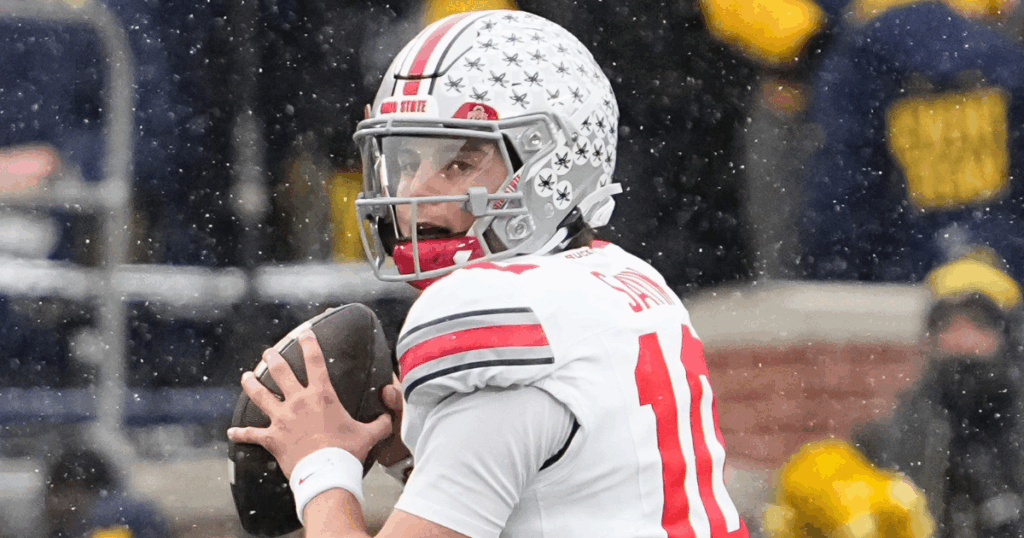
It was a disappointment in New York for Ohio State quarterback Julian Sayin. A Heisman finalist this season, he didn’t end up going home with the hardware. Instead, he’ll have to refocus on the College Football Playoff and winning on the field.
As a redshirt freshman, Sayin was a Heisman finalist. He’ll be back again in 2026 with added experience that is almost impossible to find in college football. So, there’s no reason why he can’t win.
Jeremiah Smith, WR, Ohio State Buckeyes
Coming into the 2025 season, Jeremiah Smith was commonly thought of as the best receiver in all of college football. He wouldn’t end up winning the Biletnikoff Award or being a Heisman finalist, though he was still thought of as the most talented receiver in the country.
Just a sophomore, Smith will be back next season and will, once again, be among the most thrilling players in the game. The only concern is whether or not he and Sayin will steal Heisman votes from one another.
Marcel Reed, QB, Texas A&M Aggies
Marcel Reed has been a revelation at quarterback for Texas A&M. The Aggies’ signal caller led Texas A&M to the College Football Playoff and has made them a legitimate threat to win the national championship. He’d use both his arm and legs to get there too.
As one of the most exciting players in the game who plays on a massive stage in the SEC, Reed is going to have the spotlight on him in 2026. If he plays up to his capability, he’ll be in the Heisman conversation once again. There’s no reason to think he can’t win it too.
Jayden Maiava, QB, USC Trojans
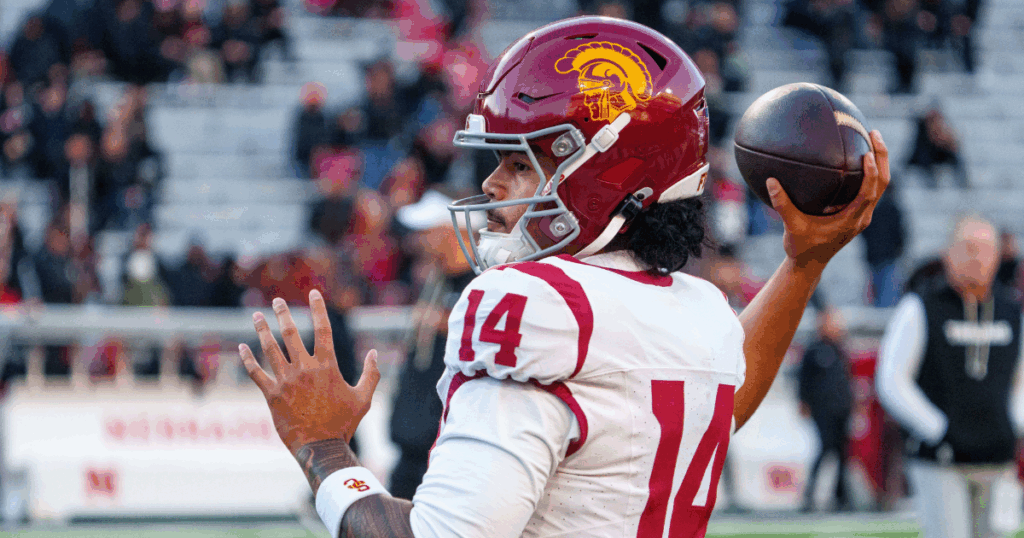
After taking over as the USC starter late in 2024, Jayden Maiava would hit his stride in 2025. Now, he and head coach Lincoln Riley are looking for a way to build on that once again.
If there is one thing that Lincoln Riley has found success doing it’s developing quarterbacks and explosive offenses. That’s led to Heisman Trophy success, including at USC. So, it’s not unfair to have high expectations for next season.
Other names to know
Ty Simpson, QB Alabama Crimson Tide
Alabama quarterback Ty Simpson is eligible to turn his attention to the NFL Draft next season. If he chooses to return to college, though, Simpson is going to be viewed as one of the best quarterbacks in the entire sport. He could very well even be a Heisman contender.
Gunner Stockton, QB, Georgia Bulldogs
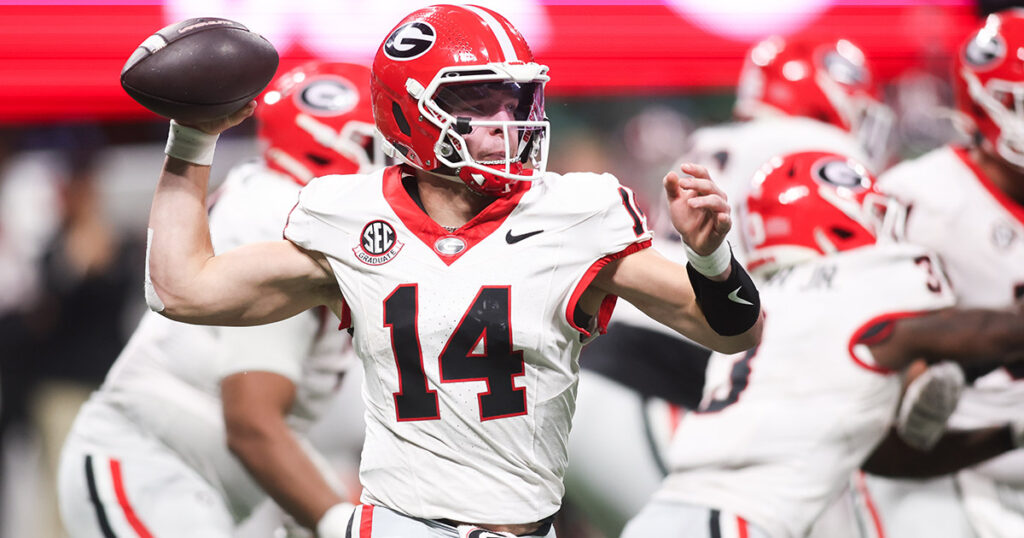
Georgia managed to win the SEC and a first round bye in the first season Gunner Stockton led the Bulldogs as their starting quarterback. He’ll likely be back next season with much higher expectations from the jump. So, he could feasibly end up in the Heisman race more so than he was in 2025.
Drew Mestemaker, QB, North Texas Mean Green
There is a chance that Drew Mestemaker could be a transfer this offseason, as his head coach is on his way to Oklahoma State. That comes after the pair combined for a phenomenal season at the Group of Five level. With more attention on him from the start, regardless of where he’s playing, the Heisman isn’t out of the question.
Sam Leavitt, QB, Arizona State Sun Devils
For the past two seasons, Sam Leavitt has been vital to making Arizona State one of the best teams in the Big 12. Now, there are rumblings that he could transfer. Regardless of where he ends up, Leavitt should be a Heisman contender.
Ahmad Hardy, RB, Missouri Tigers
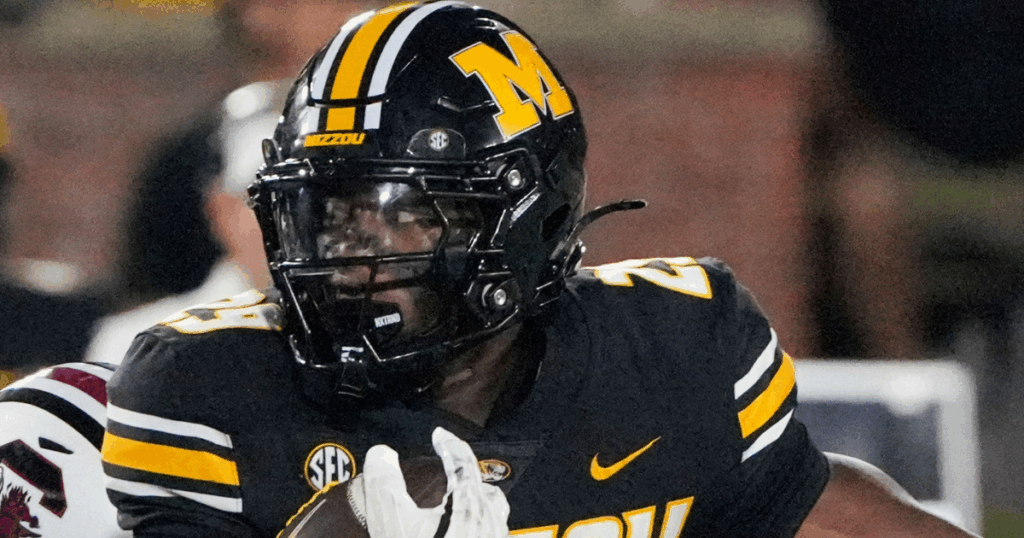
The Missouri Tigers managed to find one of the best running backs in the entire country this season, bringing in Ahmad Hardy. He’d rush for 1,560 yards and 16 touchdowns in 2025. If he can build on that in 2026, the Heisman may not be able to ignore his success.
Kewan Lacy, RB, Ole Miss Rebels
Another running back to keep an eye out on for the Heisman race next season is Kewan Lacy. The Ole Miss running back had 20 rushing touchdowns this year. That’s hard to ignore, but it’s also hard to replicate.
NIL
Dan Lanning Reveals Reasoning Behind His Loyalty to Oregon
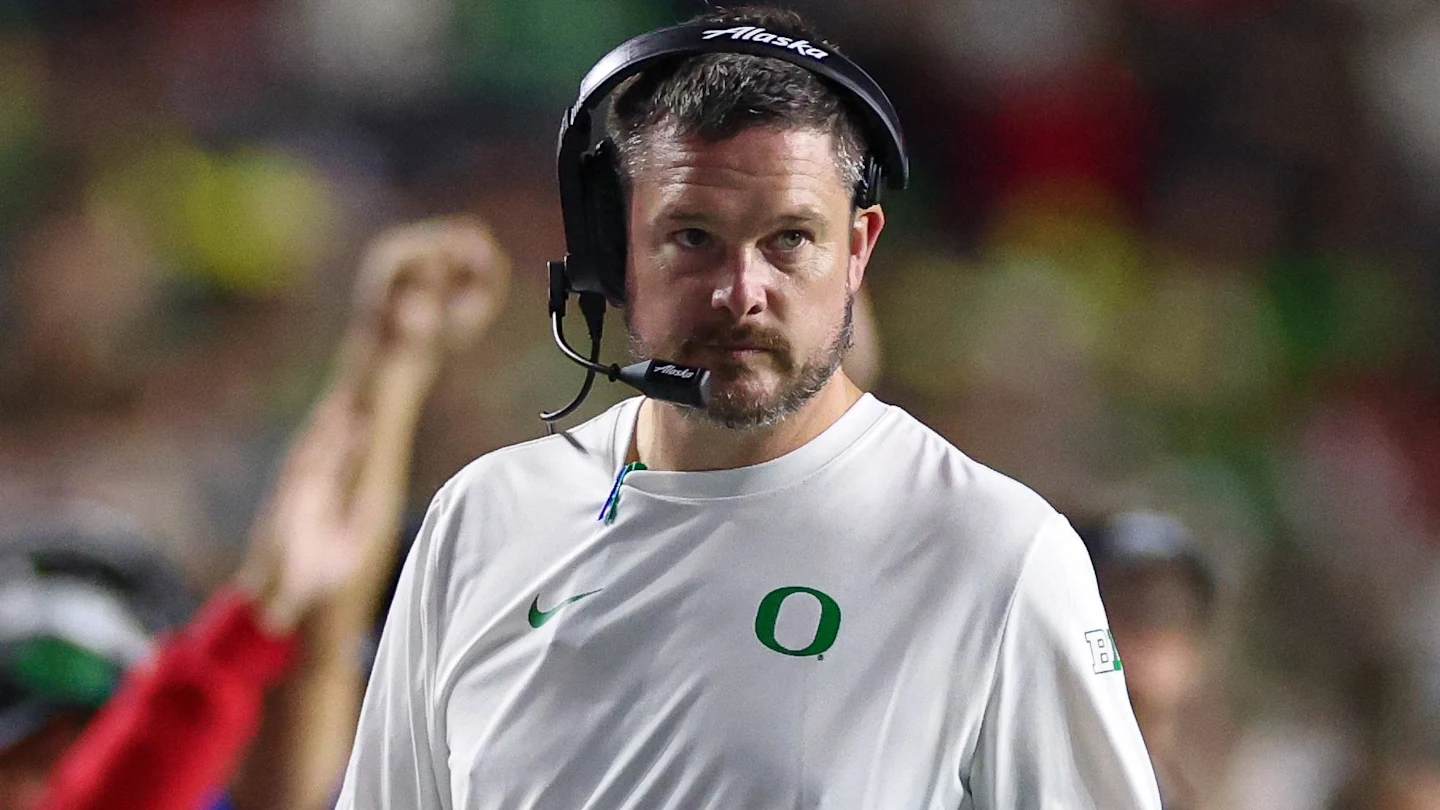
Dan Lanning has been asked many times since 2022 if he’d leave the Oregon Ducks for another head coaching job. While rumors have swirled pertaining to college football openings, a position in the NFL is something that could’ve lured Lanning away from Eugene in the past.
But the Ducks’ coach revealed on The Inner Circle Podcast that his former aspiration of coaching at the professional level is old news.
Dan Lanning Remains Committed to Oregon

Lanning spoke about how he started writing his career goals on his mirror when he was at Arizona State.
“I still put my goals on my mirror,” he said. “No. 1 best father on staff, best husband on staff, man of integrity, Christian, five recruits.”
Lanning, who was a graduate assistant for the Sun Devils, wanted to become a full-time employee. He checked that off the list by getting hired as the on campus recruiting coordinator.

“My next goal on there was head coach, 35. I thought that was really important to me,” Lanning said. “Well, I became the head coach at Oregon at 35. Next goal on there is NFL coach. That ain’t on my goal board no more. It’s off my board. It’ll never be up there again like that.”
Oregon hired Lanning as its football head coach on December 11, 2021, after he won as National Championship as the Georgia Bulldogs defensive coordinator. He’s quickly made a name for himself as one of the top young college football coaches.

Despite Lanning’s name getting thrown around as a candidate for vacancies like Alabama in 2024 or LSU in 2025, he’s remained vocal that Eugene is where he wants to be.
“I truly believe this will be my last job,” Lanning said. “The secret to that is I gotta win. Now do I coach as long as Nick Saban did? I don’t know about that.”
MORE: Weather Concerns Begin For Oregon’s Playoff Game vs. James Madison
MORE: Three Reasons Why Oregon Could Be The Most Dangerous Playoff Team
MORE: Oregon Ducks Projected to Make Program History In 2026 NFL Draft
SIGN UP FOR OUR NEWSLETTER HERE!
Dan Lanning Opens Up About Finishing His Career at Oregon
Staying with the Ducks seems to have additional meaning for Lanning beyond just his loyalty to the program. He said his family plays a major role in why he wouldn’t take an NFL job.
“It used to be a dream, but dreams can change,” Lanning said. “When we took this job, two of my kids had lived in eight states. And you realize, dang, like is that fair to them?”
“So, we took this job, I made a promise to my kids that you’re going to graduate from the same high school. You’re going to graduate from the same middle school,” he continued. “Like, those things are way more important to me than getting the opportunity to coach in the NFL.”

Lanning coached at six different schools from 2011 to 2021 before taking the job at Oregon. He’s coached the Ducks to a second consecutive College Football Playoff this season.
No Oregon head coach has spent more than five full seasons with the program since Mike Bellotti coached from 1995 to 2008. Lanning can change that in 2026.
NIL
Adidas releases tribute to Indiana QB Fernando Mendoza after winning Heisman Trophy

As Fernando Mendoza put the finishing touches on a Heisman Trophy-winning season, he signed an NIL deal with adidas. Shortly after he won college football’s highest honor, the brand paid tribute.
Adidas released a video honoring Mendoza after he won the Heisman on Saturday night. The brand paid homage to his viral quote following the Big Ten Championship when the IU quarterback told FOX Sports’ Jenny Taft, “The Hoosiers are flippin’ champs.”
SUBSCRIBE to the On3 NIL and Sports Business Newsletter
Throughout the year, Mendoza not only became one of the biggest stars on the field, but one of the top names in the sport. He has a $2.6 million On3 NIL Valuation as Indiana soon prepares for the College Football Playoff as the No. 1 seed.
Just before IU took on Ohio State in Indianapolis, Mendoza announced his high-profile NIL deal with adidas. He is the latest college football star to partner with the Three Stripes, joining Ohio State receiver Jeremiah Smith and Nebraska quarterback Dylan Raiola, among others.
“Excited to share that I’ve accepted an opportunity to join adidas!” Mendoza wrote in a LinkedIn post. “I’m very grateful for everyone who has supported me along the way and excited to bring my passion for sport, leadership, and work ethic to the Three Stripes. Let’s get to work.”
More on Fernando Mendoza’s Heisman season
Mendoza led the nation with 33 touchdown passes this year while completing 71.5% of his passes for 2,980 yards, to just six interceptions. Additionally, his $2.6 million On3 NIL Valuation ranks No. 5 in college football and No. 7 in the On3 NIL 100, the first of its kind and defacto NIL ranking of the top 100 high school and college athletes ranked by their On3 NIL Valuation.
Fernando Mendoza beat out Vanderbilt quarterback Diego Pavia for the award, garnering 643 first-place votes and 2,362 points. Pavia got 189 first-place votes and 1,435 points. It’s the latest chapter in a special season for the former Cal star, who helped lead Indiana to its first outright Big Ten title since 1945.
After the announcement, Mendoza delivered a passionate speech. As he wrapped, he had a message for young athletes who think they’re not getting enough attention or are ranked high enough.
“The truth is, you don’t need the most stars, hype or rankings,” Mendoza said. “You just need discipline, heart and people who believe in you. And you need to believe in your own abilities. I hope this moment shows you that chasing your dreams are worth it, no matter how big or impossible they seem.”
NIL
Charles Barkley on NIL, transfer portal: ‘You should not have the ability to get a better offer every year’

NBA legend Charles Barkley has not been shy about his thoughts on NIL and the transfer portal. During Saturday’s Kentucky vs. Indiana broadcast, he candidly discussed the landscape again.
Barkley called the game on ESPN alongside Dick Vitale, the first of two games they will work together. Vitale called for “stability” in college basketball – and college sports as a whole – because of the amount of player movement via the portal. He used Indiana as an example since new coach Darian DeVries virtually built the program from scratch.
Advertisement
SUBSCRIBE to the On3 NIL and Sports Business Newsletter
While Barkley acknowledged he’s in favor of athletes making money through NIL, he also called out players staying more than their four years of eligibility. In addition, he disagreed with the idea of athletes being allowed to seek better offers after every season.
“No. 1, I’m not opposed to players getting paid,” Barkley said on the broadcast. “I always want my players to get treated fairly. But I can’t remember the last time I heard the word, COVID. Some of these guys have been in college for six or seven years. If you’re in college for six or seven years, your name better be, ‘Dr. Somebody.’ You should not still be playing college basketball after six or seven years.
“But you should not have the ability to get a better offer every year. That’s not fair to any school that you are affiliated with because I can’t even do that. None of us can do that, take a better – Amazon, anybody or FOX Sports can come and say, ‘Well, we’ll give you more money and you can leave after every year.’ That’s not fair. … We’ve got to put some guardrails on these sports.”
Advertisement
One of the other new parts of the college basketball landscape is G-League players seeking eligibility. The NCAA has changed its approach regarding players who played in the G-League, arguing they were not professional athletes in a way the old rule said. Instead, if those players are within five years of their high school graduation, they could become eligible unless they went through the NBA Draft process or signed an NBA contract.
To Charles Barkley, that’s another area that needs fixing. He does not think former G-League players should be able to play college basketball.
“We’ve got guys playing in the G-League coming back to college sports now,” he said. “I don’t think that’s fair.”
-

 Rec Sports3 weeks ago
Rec Sports3 weeks agoFargo girl, 13, dies after collapsing during school basketball game – Grand Forks Herald
-

 Motorsports3 weeks ago
Motorsports3 weeks agoCPG Brands Like Allegra Are Betting on F1 for the First Time
-

 Sports3 weeks ago
Sports3 weeks agoTwo Pro Volleyball Leagues Serve Up Plans for Minnesota Teams
-

 Sports3 weeks ago
Sports3 weeks agoUtah State Announces 2025-26 Indoor Track & Field Schedule
-

 Sports3 weeks ago
Sports3 weeks agoSycamores unveil 2026 track and field schedule
-

 Motorsports2 weeks ago
Motorsports2 weeks agoRedemption Means First Pro Stock World Championship for Dallas Glenn
-

 Sports3 weeks ago
Sports3 weeks agoTexas volleyball vs Kentucky game score: Live SEC tournament updates
-

 Motorsports2 weeks ago
Motorsports2 weeks agoJo Shimoda Undergoes Back Surgery
-

 Rec Sports2 weeks ago
Rec Sports2 weeks agoRobert “Bobby” Lewis Hardin, 56
-

 Rec Sports2 weeks ago
Rec Sports2 weeks agoHow this startup (and a KC sports icon) turned young players into card-carrying legends overnight

























